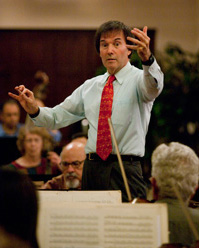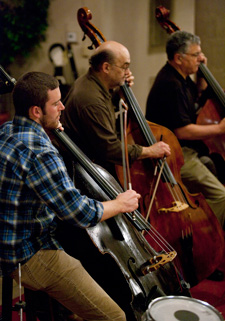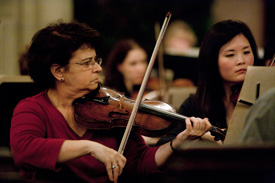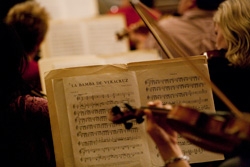Los Angeles lawyers settle on music
By Kristina Horton Flaherty
Staff Writer
 |
| Attorney-Conductor Gary S. Greene was amazed at the number—and quality—of attorney-musicians interested in joining the Los Angeles Lawyers Philharmonic. |
More than 40 lawyers, judges, law students and legal staffers streamed through the open doors of a near-empty Los Angeles church one recent evening and prepared for two hours of intense work.
But there would be no settlement talks or legal arguments or objections.
They had come to practice music, not law. And on attorney-conductor Gary S. Greene’s cue, the Los Angeles Lawyers Philharmonic struck up a piece of classical music that filled the cavernous Wilshire United Methodist Church.
Founded by Greene less than two years ago, the philharmonic — reportedly one of the few such orchestras of its kind nationwide — is attracting a growing audience. Dubbed “LA’s Only Legal Orchestra” by the city council, the orchestra has performed 15 times so far, including once in a major concert hall. And the booking requests keep rolling in.
They perform a range of classical and popular selections. And the idea of so many attorneys and judges making music together in a full-sized orchestra of their own continues to spark curiosity and surprise, even among other lawyers.
“My colleagues are surprised when I tell them I play in an orchestra,” said education lawyer Jack Lipton, a string bass player since junior high school. “They think I’m kidding . . . They don’t think of me that way, as being a lawyer and a musician.”
 |
| Eric Schaeffer, Louis Fantasia and Jack P. Lipton (left to right) perform in the string bass section of the Los Angeles Lawyers Philharmonic. |
But Lipton, who had just spent the day arguing with other attorneys and scrutinizing contracts and a 40-page lease, says he looks forward to the weekly Monday night practice sessions. “There probably was a time — maybe 10 years or more — when I frankly didn’t even touch the instrument,” said Lipton, who later played only occasionally with a youth orchestra as an alum. “When I came here, I really hadn’t been in an orchestra for years and years. So it was a wonderful opportunity.”
Greene first hatched the idea of a lawyers’ orchestra in 2008 after meeting a local judge who happened to be an accomplished trumpet player. It occurred to Greene that there might be enough musical attorneys and judges to form an actual orchestra. The since-retired superior court judge, Brett Klein, quickly volunteered and ticked off a list of other musically trained jurists.
When a local legal newspaper offered an awards dinner as a venue for the yet-to-be-formed orchestra’s debut, all the attorney-conductor needed was the musicians. And with the event less than two months away, he needed them fast. An e-mail blast put out the call for advanced musicians who also are attorneys, judges, law students or legal staff. “Within literally a week to 10 days, I had over 100 responses,” Greene recalls, still incredulous.
A few came from as far away as San Francisco and San Diego. Most of the candidates had been professionally trained at such schools as Juilliard, the New England Conservatory and the USC Thornton School of Music. “It blew my mind,” Greene said.
Semi-retired family law attorney David Waller, who plays the cello, still recalls receiving that first e-mail seeking musicians. He had played with various community orchestras over the years, most recently a Vietnamese-American philharmonic, but could not find a good fit. “It was like God had sent this e-mail to me,” he said.
Greene, an attorney for 35 years, admits he worried a little about the selection process at first and asked himself: “Do I really want to audition judges?” But he had no time to hesitate. “I had to find a place to rehearse,” he said, “and select the music. And I had no idea whether they really could play.”
But Greene was no newcomer to orchestra management or conducting. As a young child, he watched and imitated a beloved uncle, Dr. Ernst Katz, who conducted the acclaimed Jr. Philharmonic Orchestra in Los Angeles for more than 70 years. Katz founded that orchestra in 1937 with the motto: “Give youth a chance to be heard.” Greene also learned to play several instruments, including the piano and violin, and became the Jr. Philharmonic concertmaster as a teenager. After years of assisting his now-deceased uncle, he now manages and conducts the Jr. Philharmonic himself.
In forming the lawyers’ orchestra, he didn’t just need musicians. He also needed the right balance of musicians. “There are a lot of attorney drummers,” Greene said. “Pianists and drummers probably led the way.”
But he managed to end up with a mix of 30 musicians. He then e-mailed them the music and waited for the first rehearsal, figuring he could round up a few seasoned musicians, if necessary, to step in at the last minute. That was before he heard his fledgling orchestra play for the first time. “Once I heard the first few measures,” he recalls, “I said, ‘We’re okay.’”
 |
| Retired Superior Court Judge Aviva K. Bobb decided to become a violinist at age 5 after hearing renowned Yehudi Menuhin perform in concert. |
The orchestra, now 75 strong, has exceeded Greene’s expectations, receiving a standing ovation at their January 2009 debut performance. Since then, they have performed at local bar events, the LA County Law Library and the Radio and Television News Association’s Golden Mike Awards. They dressed in red, white and blue for a Fourth of July performance at the Los Angeles Farmers Market. In July, they performed for an audience of more than 1,500 at the Walt Disney Concert Hall.
During the State Bar’s annual meeting in Monterey last September, the Girardi Keese law firm had the orchestra flown in to perform — along with singer-songwriter Paul Anka — at a special reception for retiring Chief Justice Ronald George and outgoing State Bar President Howard Miller. Attorney Thomas Girardi had become a fan, and big supporter, of the lawyer-musicians after hearing them play at an awards dinner earlier this year. He found it particularly surprising that so many lawyers and judges could be such “spectacular” artists. “Practicing law is not an artistic business,” he said. “Everybody who’s heard them is simply blown away.”
In serenading the outgoing chief justice with personalized lyrics set to the song, “My Way,” Anka highlighted the orchestra as well. “Talented lawyers swing this scene/ led by conductor Gary Greene,” the former teen idol crooned to the crowd. “They’ll send their bill, why sugar-coat/ I bet they’re charging by the note.”
Lawyer-driven orchestras reportedly only exist in a few other cities. Boston and Chicago, for example, both have local bar-sponsored lawyers’ orchestras, but their conductors are not attorneys. New York City once had such an orchestra but now has a lawyers’ chamber music group and chorus instead.
At the Los Angeles orchestra’s recent practice session, Greene guided the musicians through music by Tchaikovsky, Beethoven and an Australian judge-composer who initially introduced himself to Greene via e-mail. Swaying with the music, he punctuated the air with his baton. “A little lighter. A little softer . . . . Articulation,” he implored as he led them through a selection from “My Fair Lady.”
Long-time actress June Lockhart smiled broadly from a nearby church pew. A past emcee for the orchestra, she remains one of its greatest fans and shows up for the practice sessions whenever she’s in town. “No matter how bad the week is, or the day,” she said between musical selections, “it’s all okay if you know you’re going to get a little Brahms at night.”
 Many in the orchestra have been playing music since childhood. Entertainment attorney-percussionist Gregg Victoroff, for example, got his start as the little drummer boy in a Christmas pageant at age 10. As an orchestra percussionist, he has since performed with such artists as Santana, Jefferson Starship, Huey Lewis & the News and, more recently, with his own jazz ensemble.
Many in the orchestra have been playing music since childhood. Entertainment attorney-percussionist Gregg Victoroff, for example, got his start as the little drummer boy in a Christmas pageant at age 10. As an orchestra percussionist, he has since performed with such artists as Santana, Jefferson Starship, Huey Lewis & the News and, more recently, with his own jazz ensemble.
Superior Court Judge Helen Bendix, a violist, started taking violin lessons at age 7 at her mother’s bidding. “My mother wanted a trio,” she said. “My twin sister Alice had bigger hands, so she was the pianist. And my mom played cello.” Bendix dropped any thoughts of a professional career in music at about age 10, she says, when she realized she would never be as good as Isaac Stern. But she went on to play in orchestras at Cornell and Yale, and “as a decent amateur” currently plays with two orchestras and two quartets.
The benefits, she says, go beyond the music. Learning to play an individual instrument in the context of a group — given the kind of listening and sensitivity to the group’s dynamics that is necessary — “is a great lesson in anything you do, including being a judge,” she said. “In the same way athletics sometimes helps people in their careers because it gives them certain life skills, I think music does the same thing.”
Some of the attorney musicians even see a correlation between law and music. Lawyers and musicians alike need focus, organizational skills and a certain logic, some say. One says that both have to communicate ideas. And many point out the discipline required to master both the law and a musical instrument. “We’re used to sitting in a chair for a very long time,” said commercial litigator Stephen Farkas, who plays trumpet.
A professional trumpet player at one time, Farkas initially went to law school as a way to get into orchestra management, then found himself unexpectedly drawn to commercial litigation and product liability instead. He has since been recognized by Los Angeles Magazine as a Southern California “Rising Star.” These days, he says, he sees himself as simply a lawyer whose hobby is playing the trumpet.
Probate, trust and estate litigator Marc Sallus, who plays the baritone, views himself as equal parts musician and lawyer. From a musical family in upstate New York, Sallus took piano lessons from a concert pianist at age 7 and eventually studied trumpet and baritone as well. As a teenager, he realized that making a living as a musician would be very difficult. But while he pursued a legal career, he never stopped playing music. And he’s noticed that people respond to him differently when they find out he’s a musician.
On a trip to Chicago for an ABA meeting, he brought his suitcase and computer “as a lawyer,” as well as his baritone in its case, which attracted some attention. “I was treated so nicely as a musician,” he said. “I got great treatment.”
Many of the attorney-musicians say their music revitalizes them as well. Greene, for example, currently runs two orchestras and holds auditions on the first floor of the building that houses both his family’s hat-manufacturing business and his law offices. His journalist daughter, Debra, pitches in to help coordinate the new orchestra. But between the family business and an active law practice, he is very busy. It’s the music, he says, that refreshes him as a lawyer. “This is not an easy business, but when I leave the law office and I go into the rehearsal session, I’m focused 100 percent on the music,” he said. “The two together are very complementary.”
Recently, Greene was chosen to receive a 2011 Metropolitan News-Enterprise “Person of the Year” award for establishing the lawyers’ philharmonic. Co-publisher Jo-Ann W. Grace wrote: “Through the lawyers phil, he has not only entertained the legal community at numerous events, but has done much to unify it.”
Greene suggests that the lawyers’ orchestra may be putting “more of a human face” on the legal profession as well. There are those, he says, who see no connection between lawyers and music. “They see lawyers on a pedestal in one area of society and they see a symphony orchestra on another,” he said. “So when I put the two together, all of a sudden, all ears are up, everybody’s listening. And they like what they hear.”
• To hear the Los Angeles Lawyers Philharmonic play, go to YouTube.com and type in the orchestra’s name. And for more information on the orchestra, auditions and upcoming concerts, go to LALawyersPhil.org.